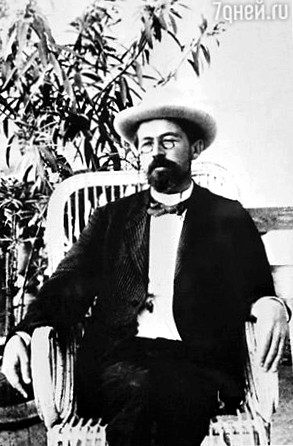
Chekhov once conceived a novel "On Love". For many months he wrote, then he crossed something out, cut it short. As a result, only one sentence remained from the novel: "He and she fell in love, got married and were unhappy …" Anton Pavlovich himself was afraid of marriage. He even dreamed an obsessive nightmare that he was married to a completely unknown, strange and unloved woman, and besides, he was scolded in all the newspapers for something ..
Autumn 1889. Chekhov is 29 years old. He is a district doctor and already a famous writer.
"Medicine is a lawful wife, literature is a mistress," defined Anton Pavlovich himself. He, burdened with a large family and debts, just couldn't make up his mind about one thing. Although driving on muddy country roads, scarlet fever, diphtheria, catarrh, worms and the eternal battle with typhus tired him immensely, he had been suffering from tuberculosis for five years and coughing up blood. Yes, and the "mistress literature" has been a bit moody lately. The plays "Ivanov" and "Leshy" were not successful on stage, the stories that every year became less cheerful, the audience began to scold … At home it is also not good. A drinking father, an oppressed mother, three brothers, one dumber than the other. They always got stuck in some stories, and Anton had to help … A joy – Sister Masha. Businesslike, collected, devoted, she was his right hand in all matters, and the household was all hers: the house and the vegetable garden and the apple orchard and workers and eternal guests ..
Friends and simply unknown people, invited and uninvited, came to Anton Pavlovich and lived as long as they wished. "Every passing intellectual finds it necessary to come to me and warm up and sometimes even stay overnight," Chekhov complained. – A whole legion of doctors!" But all this hustle brightened his monotonous, not too cheerful life … In fact, it was high time for him to marry. Yes, everything somehow didn't work out…
No, he was by no means deprived of the attention of the ladies. Tall stature, thin, even face, laughing eyes, soft voice, constant wit (not to mention talent and fame) – all worked for him.
Around Anton Pavlovich there was always a whole crowd of female fans, between which he maneuvered very successfully. There was a Petersburg writer Lydia Avilova, a married lady, who flared up with sudden sublime love for Chekhov. For example, assures that they loved each other in a previous life. Chekhov took up: "We did not manage to marry then, because we died in a shipwreck" – and improvisationally wrapped up these fancy details that only Avilova could not understand that he was making fun of her … was also a music teacher at a local village school, ugly, nervous, ridiculously elegant, all in a kind of frills, Alexandra Pokhlebina, who was called Anton Pavlovich Vermicheleva because of her slimness. Her hysterical, tearful love for him, with passionate confessions, accusations, suicide threats, sounded like paranoia ..
There was also another teacher – the masculine, broad-legged, loud Olga Kundasova – an educated lady who taught languages, mathematics and astronomy (scientific conversations with her more than once brightened Anton Pavlovich's lonely evenings). There were also volatile lustful actresses. There were many women around, but there was definitely none to marry.
And in the fall of 1889, a new face appeared in the Chekhovs' house. Masha's friend is 19-year-old Lydia Mizinova. Everybody called her Lika, and this gentle name suited her. She had very thick ash curls, wonderful gray serious eyes under sable eyebrows and a little shy but very simple appearance. Chekhov looked at them with interest, but did not seem to distinguish the young ladies in the crowd.
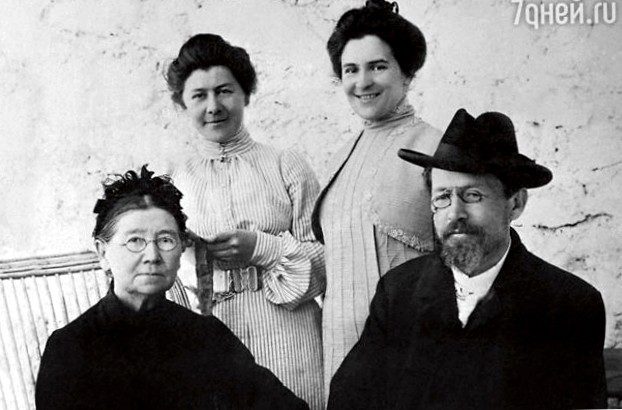
And two months later he announced his departure. Long gone. For a long time. To Sakhalin – where the convicts were kept.Why – no one has fully understood ..
They said he was in a creative crisis, they were suspected of imitating Dostoevsky. Or perhaps Przewalski, who traveled to the East. Chekhov himself claimed that he was tired of the vanity of the literary environment, he had to immerse himself in the dense Russian reality … He was discouraged, but Anton Pavlovich persevered. A whole crowd (relatives, friends) came to see him off at the Yaroslavl train station. After bidding a cordial farewell to all, Chekhov – to the latter – went to Lika. And he handed her an envelope. There was a photo of him with the inscription: "To the friendliest creature of which I run to Sakhalin and scratch my nose.
P. S. This inscription binds me to nothing". How to understand all this, Lika decidedly did not know. However, she decided to wait for Chekhov, in whom she could fall in love with all the young ladies around him, as usual.
The journey took more than seven months. First on a steamer from Yaroslavl to Perm, then in a rented car through Siberia ("They put me, a servant of God, in a wire basket and took me away," Anton Pavlovich described it all "… Then – again with water. Less than three months later, Chekhov achieved his goal of. On Sakhalin he settled in the house of a colleague – a prison doctor. Like Przhevalsky, who counted the population in the Ussuriysk Territory, he conducted – on his own and on his own initiative – a census of Sakhalin, for which he ordered ten thousand questionnaires from the local printing house, which he filled out himself by interviewing the inhabitants.
He investigated the mines and mines where convicts worked. Was present at the flogging. He came to the conclusion that hopeless despair, arbitrariness and lawlessness reign on Sakhalin, and set off on his return journey. This time – on a comfortable steamer "Petersburg" sailing to Odessa and bypassing Asia.
Missing relatives, warned by a telegram, rushed to meet Anton in Tula. They found him in a train station buffet, surrounded by a crowd of curious people: Chekhov showed three mongooses bought in Ceylon. In the Chekhovs' house, these mongooses – nimble, restless and curious animals – made such a mess that two of them had to be sent to the Moscow Zoo.
However, the remaining mongoose named bastard and alone did an excellent job and destroyed the house ..
Such a wonderful game
As soon as Chekhov returned, the same young ladies began to visit the house. Pokhlebina-Vermicheleva, clever Kundasova and … Lika. Now Chekhov no longer hid the fact that he was attracted to this gray-eyed girl in a very special way. When surrounded by people, they searched each other with their eyes and seemed to want to say a lot. As we both walked through the park, they fell sheepishly silent. When Lika returned to Moscow, Chekhov wrote her letters in which he was much bolder than in conversations. However, the tone of the letters was always a joke, and things did not go beyond half confessions. For example, Anton Pavlovich asked Likin's friend to say, "If you, son of a bitch, don't stop caring about Lika, then I, you bastard, will poke a corkscrew at the place that rhymes with Europe.
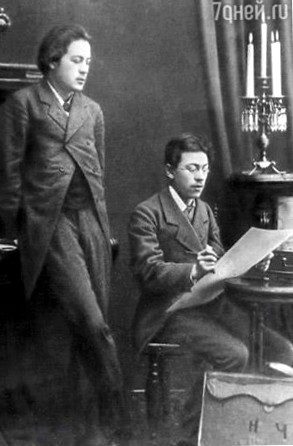
Don't you know that Lika is mine and we already have two children?"It's clear that it's a joke, but for a girl in love, it's a con. Or here's another one: "There's a big crocodile in you, Lika, and essentially I do well to obey common sense and not the heart you bit. More, more from me! Or not, Lika, wherever it went: let my head swirl from your mood and help me tighten the lasso you've already thrown around my neck." Like she didn't want to tighten that lasso! But the question is how? This Lika did not know. Sometimes Chekhov became gloomy with her, indifferent and cold, and then suddenly he brought her closer again, was occupied only with her, surrounded by a whirl of inventions, jokes, barbs, behind which tenderness shone through.
It was a delightful pull – Liku was overwhelmed by a wave of happiness and hope, and then chilled despair.
And then one day, after opening his letter, the girl blushed: This is it! Chekhov wrote: "Lika! I love you passionately like a tiger and offer you my hand." The light in front of her eyes faded and she could not immediately continue reading. And when I could, I saw the signature: "The leader of the mongrels, Golovin-Rtishchev. P.S. Say the answer with facial expressions. You are weird." What a disappointment! Joke again.
So it went month after month. The game was ambiguous, compromising for Lika, sometimes cruel, but for moments it made the girl incredibly happy. She hoped that he was just hesitating and waiting … And Chekhov, meanwhile, wrote to his friends: "I do not want to marry and I do not want anyone.
It would be boring for me to mess with my wife. And to fall in love would not hurt very much. It's boring without strong love." And again, "Excuse me, I'm getting married. But give me a woman who, like the moon, would not appear in my sky every day. Happiness that lasts from morning to morning I can not stand." He admitted that the word "forever" scared him the most. Chekhov tried to imagine this "forever" with one, even beloved, wife, and … in his mind it looked too much like slavery. But not for nothing did Anton Pavlovich say that he "spent his life squeezing a slave out of himself, drop by drop" – he knew what it was ..
In the store
Father, Pavel Yegorovich, a taganrog merchant of the second guild, came from serfs (his father, Chekhov's grandfather, who had become rich, bought both himself and his family).
But he was even an enlightened person in his own way. He loved music, played the violin, painted icons and firmly believed in the benefits of education. But he beat his sons mercilessly, like the densest man. Chekhov boys who woke up in the morning wondering whether they would be whipped today or not. Mostly whipped. And then – what is most humiliating – they still had to kiss the hand of the punishing father …
From the age of five, Anton had to help his father in the store. It was a general store where everything was sold: Tea, hair pomade, penknives, spices, rice, olive oil, buttons, smoked fish, jam, laxatives, olives, kerosene, mousetraps, brooms, cigars … peaceful neighborhood, except that tea exuded fish, coffee – kerosene and brooms – cinnamon, so there were few buyers in the store.
Once a drowned rat was found in a barrel of expensive olive oil. Pouring out the oil would be ruinous. Slowly straining and cooking from the buyers, as any merchant would do, Pavel Yegorovich did not suspect. He simply threw the drowned woman out of the barrel and invited a priest to the store to consecrate the oil and hold a prayer service. It was too wild even for the provincial Taganrog. Since then, customers have completely stopped looking in the store, and Pavel Yegorovich went into ruin by leaps and bounds ..
In Taganrog, Greeks were the richest people, and his father sent Anton and his brother Alexander to a Greek school, thinking that this would help them make a career in the future.
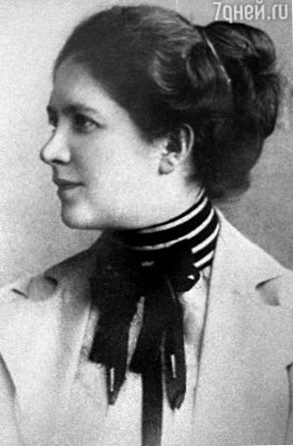
Greek was taught there, but the teacher assured Pavel Yegorovich that the boys would quickly get involved and begin to understand Greek. In fact, the excellent report cards of the two first-year brothers showed that the boys had gotten involved. But when the father asked them to speak to one of the Greeks, it turned out that neither Alexander nor Anton knew a word in that language. Turns out they sat patiently in class for an entire year listening to gibberish. And it did not even occur to them to complain: All activities in their children's world were equally boring and meaningless, and the boys thought it couldn't be any other way ..
Fortunately, things got better in the Russian gym they were transferred to (after the most severe flogging for failure in Greek). Anton realized early on that he needed to study and that this was his only chance to break into the hated world of the mercantile store.
And even when his father, completely ruined by debts, fled to Moscow and soon the whole family moved there after him, 16-year-old Anton stayed in Taganrog to finish his high school education. How he lived for several years completely alone in the city, without money and even without shelter (the Chekhovs' house went to pay creditors) – God only knows … But the work was done – the gym was over and Chekhov entered the Medical Faculty of Moscow University.
In Moscow Anton found his family in a deplorable condition. Father now sat at home all day drinking bitterly. The mother had grown terribly old and exhausted from penniless work (washing, mending clothes). The brothers unfortunately also loved wine and could not earn anything.
Anton had to face this noisy, absurd, impoverished family.
It was still necessary to live to get a doctor's degree, and Chekhov found a temporary income, as it seemed to him – to write feature articles in newspapers. And soon all Russia began to read cheerful "trifles" with the signature of Chekhonte. Over time, the stories became more masterful, more profound, but instead of the previous fun, melancholy and hopelessness began to shine through them. Which is not surprising – Chekhov did not live very happily, although he managed to get out of poverty (in the course of time, the grandson of a serf, he even managed to buy, albeit on credit, an estate near Moscow in Melikhovo, which he was terribly proud of). And then there was consumption … It is not surprising that Chekhov was in no hurry to put on a new yoke – a marital one.
Jumping girl
In vain Lika Mizinova waited for an offer from Chekhov. In the end she realized herself that Anton Pavlovich liked to play with her and thought of nothing more. Then the young lady tried to escape from Chekhov … to his friend, the artist Levitan.
At the time, Levitan was having a high-profile affair with a married woman, the wife of police doctor Dmitry Pavlovich Kuvshinnikov. Sofya Petrovna was already over forty. After all, she was ugly, dark as a mulatto, but she could boast of a great figure and art. She took painting lessons with Levitan, played the piano beautifully, and was justifiably proud of owning the most original house in Moscow. The dining room bordered on Turkish silk
Pillows and Russian peasant towels.
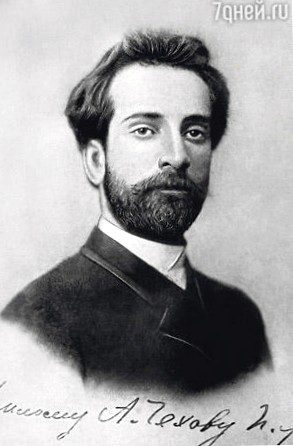
In the living room, instead of curtains, there were fishing nets on the windows. A crane was running around in the bedroom ..
At Kuvshinnikova always gathered an artistic audience. Husband Dmitry Pavlovich almost never joined the guests: he worked a lot and preferred to relax in the privacy of his study, playing chess with himself … But around midnight he always performed the ritual of inviting guests to the table. At the same time Sofya Petrovna usually shouted something like: "Dmitry! Kuvchinnikov! Let me shake your honest hand! Gentlemen, see what an expressive, magnificent face he has!"The husband, of course, knew that Sofya Petrovna was cheating on him with Levitan – this happened almost openly. But he resigned and did not interfere in anything with his original wife … And now Lika has also joined the love triangle.
She went to the Volga with the Kuvshinnikovs and Levitan to make sketches. The latter reported to Chekhov: "I write to you from this charming corner, where everything, from the air to the end, God forgive me, is the last insect on earth, permeated with it, her – the divine face! She is not here yet, but she will be here, because she loves not you, the blond, but me, the wolfish brunette."Anton did not show that he was injured. But soon his story "Jumping" was published in "Sever" magazine. The heroine had the look of Lika and the fate of Sofia Petrovna. The dissolute artist who seduced her looked caricatured, but Levitan was easy to guess in him ..
"This is a slander!" – Levitan raged. Kuvshinnikova sobbed. Even her husband, who never interfered, was unhappy: Acquaintances laughed behind her back ..
And Chekhov still pretended to justify himself: "You can imagine that one of my acquaintances, a 42-year-old lady, recognized herself in the twenty-year-old heroine of The Jumping Girl. The main evidence is that the lady paints, her husband is a doctor and she lives with the artist." Kuvshinnikovs stubbornly refused Anton Pavlovich from the house, Levitan tried to challenge the insidious friend to a duel. Only Lika was happy: it means that Chekhov is not indifferent to her and he does not want to leave her to Levitan!
Chekhov himself understood that it was time to decide. And after so many years of evasion and doubt Anton Pavlovich went to Moscow, to Lika, to surrender. He was afraid, like Podkolesin in Gogol's "The Marriage" … And then immediately on arrival appeared an acquaintance – frankly dissolute, cheerful, inclined to love experiments, poet Tatyana Shepkina-Kupernik.
And Chekhov, who wanted to delay the terrible moment of matchmaking as much as possible, let himself be drawn to visit … And there was the actress Lydia Yavorskaya, also a very dissolute lady, who wanted the famous Chekhov as her lover. In a word, these two "sirens" immediately lured Chekhov into their pool.
Lika was terribly offended. Anton Pavlovich openly cheated on her, and she didn't even have the right to protest. Who is she? No wife, no bride, not even a mistress … Lika wrote a completely crazy letter to Chekhov: "Why torture a man so deliberately? Is it really a pleasure? My burning desire is to recover from this terrible condition I am in, but alone it is so hard. I beg you, do not call me to you, do not see me."
Chekhov jokingly replied: "You have picked out the word "egoism" from the dictionary of foreign words and you treat me with it in every letter. Call your dog with this word "… And soon everything went almost as before. Almost – because it is even worse for Leakey.
Now Chekhov compared her to Pokhlebina, who "also once threatened to kill herself with a corkscrew". Not particularly embarrassed, he began fleeting "carnal" romances that left Lika in the position of a permanent but platonic lover, a potential bride. However, he always teased her with the possibility of marrying someone else: "In my life I have great news, an event … Marriage? I guess I'm getting married? If so, with whom? No, I'm not getting married, I'm selling my works." Sometimes he caught fire again with passionate love for Lika. And then he cooled down and left her somewhere.
For example, to Europe. For a long time. And he did not write to her, and in letters to his relatives he did not even ask about her, much more interested in how the bastard mongoose is doing without him. The young lady in love did not dare to show resentment. Unable to free herself from her false position, Lika in the end threw herself longingly into the arms of the emptiest of Chekhov's friends – the writer Ignatius Potapenko. They all thought Potapenko was not only a pea fool. He was also married. Lika wrote to Chekhov at that time: "I am burning my life, come and help to burn it as soon as possible, because the sooner the better". You once said that you love immoral women – that means that you won't be bored with me either. I am dying, dying day by day." Chekhov came, but did not want or could not do anything. Soon Potapenko took Lika abroad, where, as it turned out, he ..
second wife. Among other things, this man was also a bigamist. In general he left Lika alone somewhere in Switzerland, pregnant and unhappy. The child born did not live long ..
Seagull
Chekhov described this story very close to nature in The Seagull, his first really successful play. In general, much was taken from nature. Once Levitan on an unsuccessful hunt out of boredom shot a seagull, for which Kuvshinnikova scolded him terribly – Chekhov used this plot. The locket with the coded message, "If you ever need my life, come and take it," which Nina Zarechnaya gives to Trigorin, is also taken from life: Chekhov was once sent such a gift by the restless Lydia Avilova.As described in the play, the object was engraved: the name of Chekhov's book, the page number and the line where this sentence was found.
Having received a gift and even with the suggestion to "take Lydia Avilova's life," Chekhov was too lazy to even formally thank him – he held this obsessive woman in such low esteem. And Avilova was at a loss: why is he silent?? Maybe he did not get her present? I decided to find out. She hid her face under a velvet half-mask, thinking herself unrecognizable, and went to the masked ball where Chekhov, she knew, would be. And there, having introduced herself as a friend of Lydia Avilova, she asked Anton Pavlovich about the gift. He said: "Tell Lydia Alekseevna that I will give her the answer from the stage in my new play"."She had to wait a whole year for the premiere of The Seagull.
And now the premiere. Lydia Alekseevna, of course, in the box, catching every word with alarm. Trigorin on the stage receives a medallion indicating the page and line of his book, opens it and reads: "If you ever need my life, come and take it"."
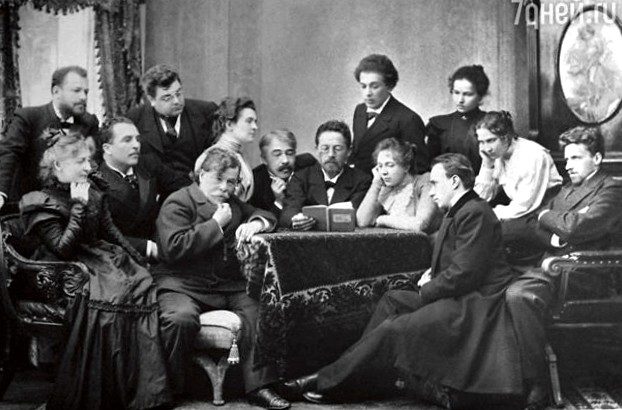
Only now the page in the play is not the same as Lydia's. She comes home, takes a Chekhov volume, opens the right page, looks for the right line … And there – an insignificant sentence. Stunned, Avilova goes to bed, and in the middle of the night a guess dawns on her. She takes a volume of her own stories and finds there, on the page and line indicated in the play, "Young girls should not be in masquerades …" ..
Lika Mizinova, who by this time had already returned from abroad, aged and grown older, also appeared at the premiere of The Seagull.
But unlike Avilova, she watched the play almost indifferently. Something broke in her soul. And even Chekhov's attempt to resume the old play did not touch her. But this time Anton Pavlovich went so far as to call Lika to marriage and even set a date for "their future happiness" – exactly one year later. Lika accepted the offer with a cold heart. And she was very little upset when Chekhov wrote her literally the next day that he asked to postpone the date for two or better three years. Apparently, Lika Mizinova finally fell in love with Chekhov. It took her nine years ..
Wedding
At that time a new woman appeared in the life of Anton Pavlovich. It was the performer of the role of Arkadina in the second theater that staged "The Seagull" – the Moscow Art Theater.
Olga Knipper, the 29-year-old daughter of a Russified Alsatian-German, is a supremely talented actress, though at the time she was not quite established in the Moscow Art Theater as a prima and was fighting with actress Maria Andreeva for that spot. Knipper was the mistress of a co-director of the Moscow Art Theater – Nemirovich-Danchenko, Andreev – of another, Savva Morozov. If the main role went to Knipper, Savva Timofeevich punished the theater with a ruble. Stanislavsky tried to act as an arbiter and wrote to Nemirovich: "Andreeva is a useful actress. And Knipper is absolutely necessary."It soon got to the point where the co-directors even stopped to say hello. And the rivals themselves pretended to be friends. Once they started with playful renunciations: They played which of the famous writers would get which of them. Andreeva pulled out a piece of paper with the name Gorky (a few years later Maria Fedorovna really became his mistress) and Knipper – Chekhova, whom she did not even know at that time.
But everything came true! And by the way, it was only after becoming Chekhov's mistress, whose plays were a real find for the Moscow Art Theater, that Knipper finally defeated Andreeva.
Anton Pavlovich first tried to play the same game with Olga as with Lika Mizinova. He invited her to his home in Melikhovo and then to Yalta, where he moved because of a progressive illness. As with Lika, he went alone with her, joking, writing letters with half confessions. And he still preferred not to mix love and carnal needs, to keep Olga at a distance, in the position of a constant platonic lover – and no more.
But with Knipper such games did not go through. She turned out to be much more practical than Lika, she knew life better, or maybe she was just less intoxicated by love and therefore acted more decisively ..
In Chekhov's house, she almost immediately managed to place herself as a future hostess: Together with her sister and mother, she took care of dinners, organizing guests. She was not ashamed to show that she was upset and unhappy when Chekhov ran away from her to walk alone through Europe: "Why did you leave, since you have to be with me?? I followed the train for a long time, as if I didn't believe it, and suddenly I cried so much, I cried as much as I hadn't cried for many years. And most importantly, she managed to become his mistress after two years of romantic acquaintance. "You, Olga, and on horseback", – said grinning Masha Chekhova.
Very soon Olga began to talk about getting married. She complained to Anton Pavlovich that all their mutual friends kept asking when she and Chekhov would marry. That his indecision offends her. She was furious: "How long are we going to hide..? And what is it for?" Chekhov laughed at this: "My health is getting quite old – so you will get in my person not a spouse, but a grandfather. I've given up literature altogether, and when I marry you I'll tell you to leave the theater, and we'll live together like planters. You do not want? All right, play five more years and then we'll see." However, Anton Pavlovich now resisted rather sluggishly. The word "forever" didn't scare him as much as it did in the old days: He knew he didn't have long to live, five years at most. Besides, Olga would not leave the theater and move in with him in Yalta. Consequently, she promised to become exactly the woman he had once dreamed of: so that every day would not appear like the moon in his sky ..
In a word, Chekhov gave up.
" The dog is Olka!", he wrote to her in Moscow from Yalta. – I come at the beginning of May. If you give your word that no one in Moscow will know of our marriage until it is consummated, then I will marry you on the very day of your arrival. For some reason I'm terrified of the wedding and the congratulations and the champagne you have to hold in your hand and smile vaguely at the same time.
They got married in a small church in Moscow. They invited only the witnesses necessary for the ceremony: from the bride's side – her brother and uncle, from the groom's side – some random students. And after marriage they immediately boarded the train – it was decided to spend their honeymoon on the Kama River, where consumptives improved their health with kumis.
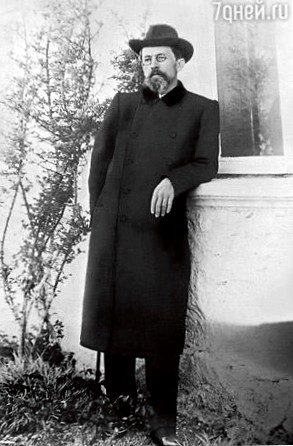
On the way Chekhov telegraphed his mother: "Dear mother, bless me, I am going to marry. Absolutely nothing will change, everything will remain as before. I will live separately from my wife."
In reply, his mother sent him congratulations and his sister Masha remained silent. For her Anton's marriage was a heavy blow. After all, Masha devoted her life to him without exaggeration. She did not marry. Although the passionately amorous Levitan and the landowner Alexander Smagin courted her. Masha herself fell in love with the latter and even dared to ask her brother for advice: to go or not to marry. But Chekhov was so expressively silent that Masha did not dare to upset him and refused the groom. At night she secretly cried into her pillow, and Anton wrote to a friend: "I don't understand anything".
There is a presumption that the nurse refused this time. This is the only girl who sincerely does not want to marry." And now Chekhov got married – was it easy for Masha to come to terms with it!
Everything the same
However, everything has really remained the same. Chekhov lived in Yalta with his mother and sister, surrounded by their tireless, devoted care. Knipper is in Moscow. Of course, she came to her husband as often as the theater allowed it. Sometimes Chekhov himself visited her in Moscow. During one of these visits he got a bad cold: he went to the Sandunovskie baths and there, already dressed in the locker room, he met an acquaintance, an obsessive and talkative person, and ran into the street with a wet head. As a result, consumption worsened.
To make matters worse, Olga's apartment was on the third floor, and every climb up the stairs (which took Chekhov at least half an hour) took away the last of his strength and health: his heart was pounding, a whistle came from his throat. In a word, Anton Pavlovich tried once again not to leave the house. He sat on the sofa, covered with pillows, with a rug on his legs, very thin, with an anemic face like a wax. And Olga had rehearsed only six hours a day, and also performances, banquets, trips to the Yar, listening to gypsies, walks in the night forest with the whole troupe – the Moscow Art Theater lived happily, bravely … Bunin, who often came to the house to keep Chekhov company, recalled: "Nemirovich in a tailcoat, smelling of cigars and expensive cologne, came by for her, and she in her evening dress, perfumed, beautiful, young, approached her husband with the words: "Don't miss me, Dusik."". At four o'clock, and sometimes in the morning, she came back smelling of wine and perfume.
Her overwhelming lust for life, in contrast to the painfulness of Anton Pavlovich, seemed repulsive to many ..
And then Chekhov went back to Yalta. From there he wrote: "It seems to me that if I would just lie down with my nose in your shoulder even half the night, I would feel better and stop sulking. I can't live without you whatever. Sweet dog, why am I not with you?"Illness and weakness apparently made him see differently the solitude and freedom he used to value so much. Now he already wanted his wife to be there every day – but that was impossible. Olga repented: "I am a terrible pig in front of you. What kind of woman am I? Since I was on stage, I had to stay alone and not torment anyone."
However, she immediately changed the subject and asked Chekhov to write another play for the Moscow Art Theater – "The Cherry Orchard". Yes, she herself was preoccupied with questions about the promotion of her husband's work, Nemirovich and Stanislavsky, languishing with impatience.
Meanwhile, it became increasingly difficult to write to the dying Chekhov. "I write every day, although little by little, but I still write. But soon, soon, horse, I'll finish it and send it."Fortunately, he managed to complete the job. Together with the text, a telegram flew to Moscow: "The piece is already dispatched. Healthy. Kiss. I bow. Anton". Soon came the answer from his wife: "A wonderful piece of. I read it with delight and tears. Kisses, thank you. Olja". And two days later a telegram from Stanislawski: "I am shocked, I can't come to my senses. I am in an unprecedented joy. I think this piece is the best of all the nice things you wrote.
My sincere congratulations to the brilliant author. I feel and appreciate every word. Thank you for the great joy that has already been delivered and the upcoming. Health".
Chekhov died six months later. In Germany, on the waters where he was hopelessly sent at the last moment to the best specialists in tuberculosis. For my wife it was very difficult to organize the transfer of the body to her home country. To everyone's horror, the coffin arrived in Moscow in a boxcar marked "For transporting fresh oysters" (this was the only refrigerated car they got, but many then accused the widow of soullessness). Chekhov was buried all over Moscow. The crowd was so large that the sister and mother barely managed to get to the coffin. And Mizinova was not successful at all. But at the memorial service in Masha Chekhova's Moscow apartment, she cried a lot, cowering in a far corner ..
At that time, Lika was married to the director of the Moscow Art Theater Alexander Sanin – their wedding took place almost simultaneously with Chekhov's.
But that apparently didn't make Liku happy – in any case, she drank. And Olga Knipper, who recovered quickly after the death of her husband, lived quite happily 55 years later: she played a lot and successfully on the stage, which was greatly facilitated not only by her talent, but also by the status of Chekhov's widow. She never remarried, even though she had affairs for a long time. Her sister Maria Pavlovna turned 93 years old. After the revolution, she became the permanent director of the Chekhov Museum, which was opened in his house in Yalta, and thus remained forever faithful to her big brother ..